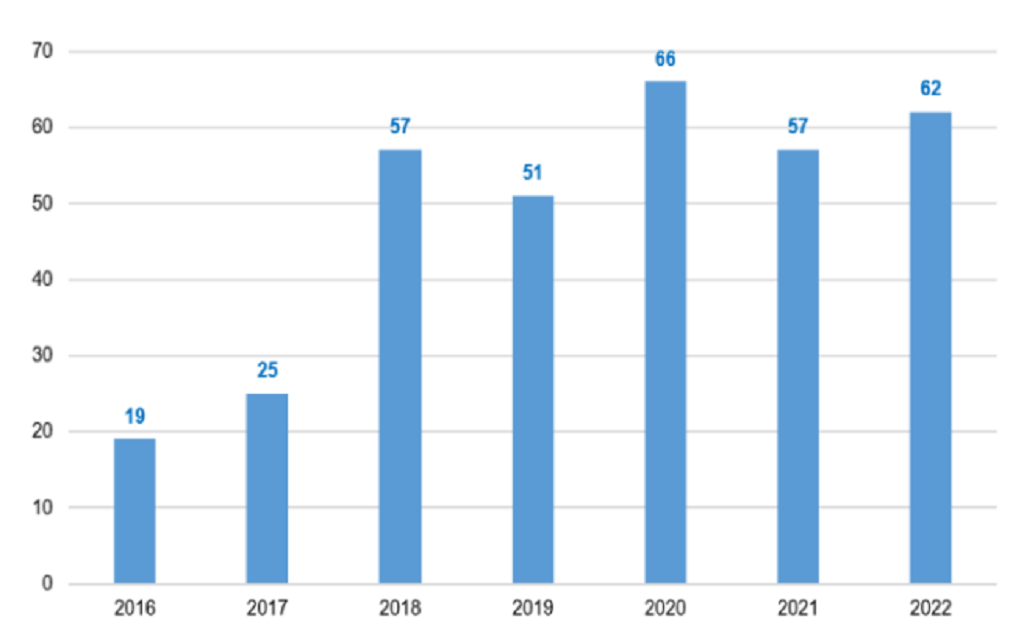

At least 955 sturgeon specimens seized during 2016-2022, the study showed



Poaching of sturgeons is rampant in the Lower Danube and poses a threat to the existence of the four endangered fish species of the family in the waterbody, according to a new report.
As many as 337 cases of illegal activities involving the fishes were reported from 2016-2022 in the river stretch, a study by the WWF-Central and eastern Europe showed. These include “130 cases from Bulgaria, 125 from Romania and 82 from Ukraine”, according to the report Poaching of sturgeon: A continuing threat to the survival of wild sturgeon in the Lower Danube region.
Sturgeons are ancient migratory fish and are considered the world’s most endangered species.
Three of the four sturgeon species found in River Danube — beluga, stellate and Russian sturgeon — are critically endangered, according to the International Union for Conservation of Nature Red List of Threatened Species. The fourth, sterlet, was upgraded to Endangered last year, the authors of the report noted.
The sturgeons come to the Danube river from the Black Sea to spawn. Two more species of the family, the European sturgeon and the ship sturgeon, that used to swim in the waters of the Danube have been declared extinct locally.
Bulgaria recorded the highest number (130) of such cases that included violations of fishing bans and regulations, seizures of illegal fishing gear and the illicit trade of sturgeon and sturgeon-based products. It was followed by Romania (125) and Ukraine (82), the report noted.
The highest number of incidents (66) was recorded in 2020, according to the analysis.
Sturgeon trafficking cases over the years

Source: Poaching of sturgeon: A continuing threat to the survival of wild sturgeon in the Lower Danube region
The actual figures are estimated to be higher since many cases go unreported, the scientists wrote. “Sturgeon have swum in the Danube for millions of years but we will lose them forever if we can’t halt the illegal catches and trade of wild caviar and meat,” said Beate Striebel, WWF Sturgeon Initiative Lead.
At least 955 sturgeon specimens were seized during the period — three in Bulgaria, 553 in Romania and 399 in Ukraine, the research showed.
Vratsa in Bulgaria, Tulcea in Romania, and Odesa in Ukraine emerged as the main hotspots — representing over a third of the reported cases in each country, the analysts observed.
A 2021 report based on a fish market survey in Bulgaria, Romania, Serbia and Ukraine where sturgeon mean and caviar is consumed the most, also had worrisome findings. As much as 20 per cent of the sturgeon samples collected from the fish markets in these countries were wild fish and did not come from farms. This was another indicator of the rampant sturgeon trafficking occuring in these places.
The report also highlighted that the poaching rings and illegal fishers often work with the connivance of corrupt officials of the government’s fishing departments who accept bribes.
On a brighter note, sturgeon conservation projects are gradually garnering more interest and funding from organisations, especially the European Union, Striebel said. Such projects will be successful only if poaching can be checked, she added.
The report, which is the first to collate and analyse the data specifically for the Lower Danube region, called for continued and stronger enforcement of rules to stop illegal activities that threaten sturgeon populations.
Innovative approaches involving advanced technology have helped curb the menace, the authors observed, citing WWF conservation efforts in collaboration with national authorities which may lack capacity.
Inter-agency cooperation and coordination for controlling the different parts of the trade chain was also suggested by the authors. They also advocated for cross-border cooperation among the responsible authorities of the Lower Danube states for monitoring and enforcement.
“Other actors engaged in the trade in sturgeon, such as fishers, aquaculture operators, retailers of all types, and even consumers should be regularly informed, and their awareness of the issue and of their obligations should be raised,” the analysts wrote.
We are a voice to you; you have been a support to us. Together we build journalism that is independent, credible and fearless. You can further help us by making a donation. This will mean a lot for our ability to bring you news, perspectives and analysis from the ground so that we can make change together.

Comments are moderated and will be published only after the site moderator’s approval. Please use a genuine email ID and provide your name. Selected comments may also be used in the ‘Letters’ section of the Down To Earth print edition.